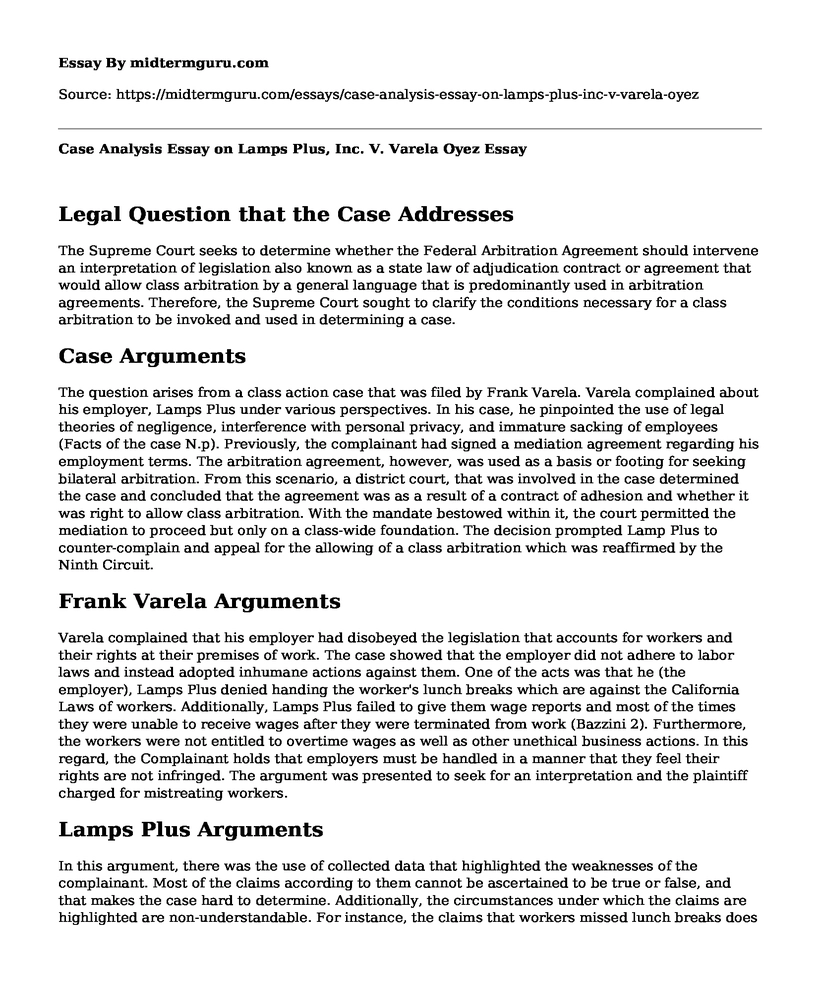Legal Question that the Case Addresses
The Supreme Court seeks to determine whether the Federal Arbitration Agreement should intervene an interpretation of legislation also known as a state law of adjudication contract or agreement that would allow class arbitration by a general language that is predominantly used in arbitration agreements. Therefore, the Supreme Court sought to clarify the conditions necessary for a class arbitration to be invoked and used in determining a case.
Case Arguments
The question arises from a class action case that was filed by Frank Varela. Varela complained about his employer, Lamps Plus under various perspectives. In his case, he pinpointed the use of legal theories of negligence, interference with personal privacy, and immature sacking of employees (Facts of the case N.p). Previously, the complainant had signed a mediation agreement regarding his employment terms. The arbitration agreement, however, was used as a basis or footing for seeking bilateral arbitration. From this scenario, a district court, that was involved in the case determined the case and concluded that the agreement was as a result of a contract of adhesion and whether it was right to allow class arbitration. With the mandate bestowed within it, the court permitted the mediation to proceed but only on a class-wide foundation. The decision prompted Lamp Plus to counter-complain and appeal for the allowing of a class arbitration which was reaffirmed by the Ninth Circuit.
Frank Varela Arguments
Varela complained that his employer had disobeyed the legislation that accounts for workers and their rights at their premises of work. The case showed that the employer did not adhere to labor laws and instead adopted inhumane actions against them. One of the acts was that he (the employer), Lamps Plus denied handing the worker's lunch breaks which are against the California Laws of workers. Additionally, Lamps Plus failed to give them wage reports and most of the times they were unable to receive wages after they were terminated from work (Bazzini 2). Furthermore, the workers were not entitled to overtime wages as well as other unethical business actions. In this regard, the Complainant holds that employers must be handled in a manner that they feel their rights are not infringed. The argument was presented to seek for an interpretation and the plaintiff charged for mistreating workers.
Lamps Plus Arguments
In this argument, there was the use of collected data that highlighted the weaknesses of the complainant. Most of the claims according to them cannot be ascertained to be true or false, and that makes the case hard to determine. Additionally, the circumstances under which the claims are highlighted are non-understandable. For instance, the claims that workers missed lunch breaks does not address what made them lose such essential rights. The employer then sought to solve the case by the use of a class arbitration that was disputed heavily and an intervention from the Supreme Court was necessary (Wells N.p). The Supreme Court's case was essential in determining this stalemate.
Self-Opinion
According to this case, the Supreme Court has a hard task to get a solution. For instance, it has the mandate to ensure that personal rights are well addressed and taken care in the legal proceedings. On the other hand, there is a need to reaffirm that the lower court's decision to be ambiguous. In my opinion, the Supreme Court should allow for class arbitration to ensure that future skirmishes and lawsuits of this kind do not emerge at all. In addition, it would enable complainants to seek collective lawsuits against their employers once mistreated.
Works Cited
Bazzini, Terry. "In The Court of Appeal of the State of California Second Appellate District Division Three." http://www.courts.ca.gov/opinions/revpub/B220954.PDF Accessed 30 Sept. 2018.
Facts of the Case." Lamps Plus, Inc. V. Varela. Oyez www.oyez.org/cases/2018/17-988 Accessed 30 Sept. 2018.
Wells, Porter. "Age Bias, Arbitration Agreements on High Court's Early Docket." Bloomberg BNA News, news.bloomberglaw.com/daily-labor-report/age-bias-arbitration-agreements-on-high-courts-early-docket. Accessed 30 Sept. 2018.
Cite this page
Case Analysis Essay on Lamps Plus, Inc. V. Varela Oyez. (2022, Sep 06). Retrieved from https://midtermguru.com/essays/case-analysis-essay-on-lamps-plus-inc-v-varela-oyez
If you are the original author of this essay and no longer wish to have it published on the midtermguru.com website, please click below to request its removal:
- Human Right in Kurdistan, Saudi Arabia and Syria - Paper Example
- Crimes Script Analysis and Situational Prevention - Paper Example
- Paper Example on Restorative Justice: Model for Victoria
- Nationally Legalizing Marijuana - Research Paper
- Restorative Justice: Rehabilitation, Reconciliation, and the Affected Parties - Essay Sample
- US Laws: Protecting Citizens and Creating Harmony - Essay Sample
- Unfairness in Law Despite Legal Process: Examining Evidence Rules in Courts - Research Paper







